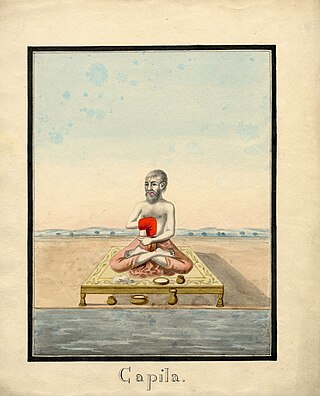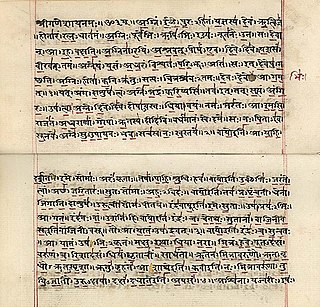Related Research Articles

Patanjali was an author, mystic and philosopher in ancient India. He is believed to be an author and compiler of a number of Sanskrit works. The greatest of these are the Yoga Sutras, a classical yoga text. Estimates based on analysis of his works suggests that he may have lived between the 2nd century BCE and the 5th century CE. Patanjali is regarded as an avatar of Adi Sesha.

Kapila, also referred to as Cakradhanus, is a Vedic sage in Hindu tradition, regarded the founder of the Samkhya school of Hindu philosophy.

The Yoga Sutras of Patañjali is a compilation "from a variety of sources" of Sanskrit sutras (aphorisms) on the practice of yoga – 195 sutras and 196 sutras. The Yoga Sutras were compiled in India in the early centuries CE by the sage Patanjali, who collected and organized knowledge about yoga from Samkhya, Buddhism, and older Yoga traditions, and possibly another compiler who may have added the fourth chapter. He may also be the author of the Yogabhashya, a commentary on the Yoga Sutras, traditionally attributed to the legendary Vedic sage Vyasa, but possibly forming a joint work of Patanjali called the Pātañjalayogaśāstra.
In Sanskrit texts, Rāja yoga was both the goal of yoga and a method to attain it. The term also became a modern name for the practice of yoga in the 19th-century when Swami Vivekananda gave his interpretation of the Yoga Sutras of Patanjali in his book Raja Yoga. Since then, Rāja yoga has variously been called aṣṭāṅga yoga, royal yoga, royal union, sahaja marg, and classical yoga.
Vijñānabhikṣu was a Hindu philosopher from Bihar, variously dated to the 15th or 16th century, known for his commentary on various schools of Hindu philosophy, particularly the Yoga text of Patanjali. His scholarship stated that there is a unity between Vedānta, Yoga, and Samkhya philosophies, and he is considered a significant influence on Neo-Vedanta movement of the modern era.
Baljinath Pandit (1916–2007) was a Sanskrit scholar and authority on Kashmir Shaivism.

The Sangita-Ratnakara, संगीतरत्नाकर,, literally "Ocean of Music and Dance", is one of the most important musicological texts from India. Composed by Śārṅgadeva (शार्ङ्गदेव) in Sanskrit during the 13th century, both Carnatic music and Hindustani music traditions of Indian classical music regard it as a definitive text. The author was a part of the court of King Simhana of the Yādava dynasty whose capital was Devagiri, Maharashtra.

Gheranda Samhita is a Sanskrit text of Yoga in Hinduism. It is one of the three classic texts of hatha yoga, and one of the most encyclopedic treatises in yoga. Fourteen manuscripts of the text are known, which were discovered in a region stretching from Bengal to Rajasthan. The first critical edition was published in 1933 by Adyar Library, and the second critical edition was published in 1978 by Digambarji and Ghote. Some of the Sanskrit manuscripts contain ungrammatical and incoherent verses, and some cite older Sanskrit texts.

Svādhyāya is a Sanskrit term which means self-study and especially the recitation of the Vedas and other sacred texts. It is also a broader concept with several meanings. In various schools of Hinduism, Svadhyaya is a Niyama connoting introspection and "study of self".

Dimitrios Galanos or Demetrios Galanos was the earliest recorded Greek Indologist. His translations of Sanskrit texts into Greek made knowledge of the philosophical and religious ideas of India available to many Europeans.

Satya Vrat Shastri was an Indian Sanskrit scholar, writer, grammarian and poet. He wrote three Mahakavyas, three Khandakavyas, one Prabandhakavyas and one Patrakavya and five works in critical writing in Sanskrit. His important works are Ramakirtimahakavyam, Brahattaram Bharatam, Sribodhisattvacharitam, Vaidika Vyakarana, Sarmanyadesah Sutram Vibhati, and "Discovery of Sanskrit Treasures" in seven volumes.
The Aṣṭādhyāyī is a grammar text that describes a form of the Sanskrit language.
Āśrama is a system of stages of life discussed in Hindu texts of the ancient and medieval eras. The four asramas are: Brahmacharya (student), Gṛhastha (householder), Vanaprastha, and Sannyasa (renunciate).
Munshiram Manoharlal Publishers Pvt. Ltd. (MRML) is a leading publishing house located in New Delhi, India. Established in 1952 by Manohar Lal Jain, it is one of the oldest publishing houses in India.

Lal Mani Joshi was a Buddhist scholar and professor of comparative religions and Buddhist studies in a number of distinguished universities of India and USA.
Adya Rangacharya, known as R.V. Jagirdar till 1948, later popularly known by his pen name Sriranga, was an Indian Kannada writer, actor and scholar, and a member of the Adya Jahagirdar family. He was awarded the Sangeet Natak Akademi Fellowship in 1967 and the Sahitya Akademi Award for literature in 1971 for Kalidasa, a literary criticism in Kannada.
Yoga philosophy is one of the six major important schools of Hindu philosophy, though it is only at the end of the first millennium CE that Yoga is mentioned as a separate school of thought in Indian texts, distinct from Samkhya. Ancient, medieval and most modern literature often refers to Yoga-philosophy simply as Yoga. A systematic collection of ideas of Yoga is found in the Yoga Sutras of Patanjali, a key text of Yoga which has influenced all other schools of Indian philosophy.

Dr. Satyanarayana Dasa is an Indian Gaudiya Vaisnava scholar and practitioner. Dasa is a polymath, holding a Ph.D. in Sanskrit from Agra University, a degree in Indian law from Agra University, a Bachelors of Technology in Mechanical engineering from the Indian Institute of Technology and a Masters of Technology in Industrial Engineering from the Indian Institute of Technology. Currently based in India at the Jiva Institute, which he founded, Dasa has published numerous books and original papers in the field of Gaudiya Vaisnavism including translations and commentaries on the Sat Sandarbhas. His honors include an award from the President of India in 2012. Dasa has been called a leading living practitioner-scholar of Jīva Gosvāmin.
Rajendra Chandra Hazra was a scholar and Sanskritist known for his studies of Puranic literature. During an academic career spanning over four decades he wrote about 10 books and over 200 research articles on subjects ranging from his central interest in Smriti literature to "the Vedas, Vyākaraṇas, Kāvya, anthology, archaeology, world-history, paleography, and the Nyāya and Vaiśeṣika systems of philosophy."
The 8th century Pātañjalayogaśāstravivaraṇa, also called the Yogasūtrabhāṣyavivaraṇa is Ādi Śaṅkara's commentary on Patanjali's own commentary, the bhāṣya, on his Yoga Sutras.
References
- 1 2 3 4 5 6 7 8 CV of T. S. Rukimani (accessed 6 January 2020)
- 1 2 Clark, Matthew. "T. S. Rukmani". soas.ac.uk. Retrieved 6 January 2020.
- ↑ T. S. Rukmani faculty page at Concordia University, (accessed 6 January 2020).
- ↑ "Inside front Cover". Nidān: International Journal for Indian Studies. 1994 (v6). 1 December 1994. hdl:10520/AJA10165320_24. ISSN 2414-8636.
- ↑ "Editorial Board for Journal of Hindu Studies". Oxford Academic. Retrieved 7 January 2020.
- ↑ Kumar, P. Pratap; Duquette, Jonathan, eds. (2013). Classical and contemporary issues in Indian studies: essays in honour of Trichur S. Rukmani. New Delhi: D.K. Printworld. ISBN 978-81-246-0652-0. OCLC 884968023.